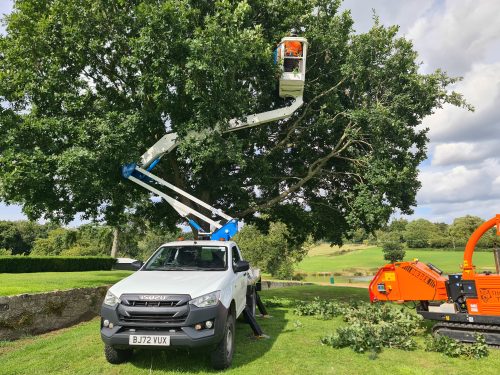 https://www.wilsontreesurgery.com/wp-content/uploads/2024/09/20230807_162313-500x375.jpg
https://www.wilsontreesurgery.com/wp-content/uploads/2024/09/20230807_162313-500x375.jpg
Machinery used in utility arboriculture
Read more
by Wilson Tree Surgery |
Tree surgery, also known as arboriculture, is a rewarding and challenging profession that involves caring for and maintaining trees in urban and natural environments. At Wilson Tree Surgery we specialise in the maintenance of trees around the Electrical Network infrastructure, this sub section of the industry is known as Utility Arboriculture and is an essential aspect in keeping the country safely supplied with electricity. If you have a passion for the outdoors, enjoy physical work, and are interested in conservation and tree health, a career in tree surgery might be perfect for you. Here’s a guide on how to get started in this fulfilling field in the UK.
Before diving in, take the time to research what tree surgery entails. It involves a range of tasks such as pruning, felling, planting, and tree health assessment. Tree surgeons also need to understand tree biology, safety protocols, and equipment use. Understanding the demands and responsibilities of the job will help you decide if it aligns with your interests and skills.
In the UK, formal qualifications are essential for becoming a tree surgeon. The most recognized qualification is the Level 3 Diploma in Arboriculture, offered by several training providers and colleges across the country. This diploma covers practical skills such as tree climbing, use of chainsaws, and tree pruning techniques, along with theoretical knowledge of tree biology, pests, and diseases.
Alternatively, many training providers offer courses from Lantra or City and Guilds that will give you the practical skills needed to embark on your arboricultural journey.
While theoretical knowledge is crucial, practical experience is equally important. Consider opportunities to work or volunteer with local tree surgeons, landscaping companies, or forestry organisations. This hands-on experience will help you develop essential skills and understand the day-to-day challenges of the job.
Apprenticeships and traineeships are excellent pathways into tree surgery. These programs offer a combination of on-the-job training and classroom learning, allowing you to earn while you learn. Many employers in the arboriculture industry actively seek apprentices to train and develop into skilled tree surgeons.
Once you’ve started your career in tree surgery, consider joining professional associations such as the Arboricultural Association or the Royal Forestry Society. These organisations provide resources, networking opportunities, and ongoing training to help you stay updated with industry standards and best practices.
In addition to technical skills, tree surgeons need strong interpersonal skills and a keen awareness of safety protocols. Communication skills are essential for working with clients, colleagues, and the public. Attention to detail, problem-solving abilities, and physical fitness are also crucial for success in this field.
Tree surgery offers various opportunities for career progression. Experienced tree surgeons can specialise in areas such as tree preservation, consultancy, or urban forestry management. Some may choose to start their own tree surgery businesses or work as consultants for local authorities, environmental agencies, or private companies.
Embarking on a career in tree surgery requires dedication, training, and a passion for the environment. By obtaining the right qualifications, gaining practical experience, and developing essential skills, you can build a successful career in this dynamic and vital profession. Whether you’re just starting out or considering a career change, the arboriculture industry in the UK offers numerous opportunities for growth and fulfilment. Start your journey today towards becoming a skilled and respected tree surgeon.
 https://www.wilsontreesurgery.com/wp-content/uploads/2024/09/20230807_162313-500x375.jpg
https://www.wilsontreesurgery.com/wp-content/uploads/2024/09/20230807_162313-500x375.jpg
Read more
 https://www.wilsontreesurgery.com/wp-content/uploads/2024/09/AdobeStock_475873508-500x333.jpeg
https://www.wilsontreesurgery.com/wp-content/uploads/2024/09/AdobeStock_475873508-500x333.jpeg
Read more
 https://www.wilsontreesurgery.com/wp-content/uploads/2024/09/pexels-valiphotos-589802-500x333.jpg
https://www.wilsontreesurgery.com/wp-content/uploads/2024/09/pexels-valiphotos-589802-500x333.jpg
Read more